Key takeaways:
- Performance anxiety often arises from the fear of judgment, and understanding its root helps manage overwhelming feelings.
- Recognizing personal triggers such as high stakes and past experiences can improve preparedness and confidence.
- Effective techniques like visualization, deep breathing, and positive affirmations can significantly alleviate anxiety.
- Seeking professional help and maintaining consistent coping strategies, such as mindfulness and journaling, fosters long-term resilience against performance anxiety.
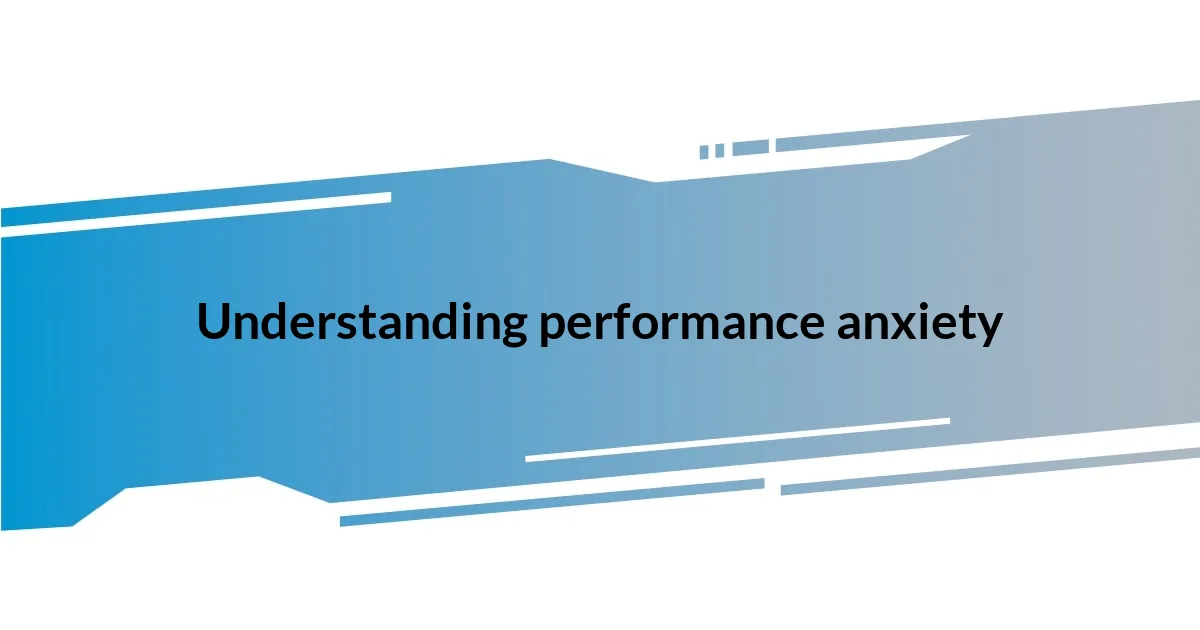
Understanding performance anxiety
Performance anxiety is that nagging feeling we sometimes get when we’re about to step onto a stage or deliver a presentation. I remember vividly the night before my first public speaking engagement; I was buzzing with nerves, questioning whether I had anything valuable to say. Have you ever felt that jittery mix of excitement and dread? It’s a common experience, one that can feel isolating even though many people face it.
When I think about performance anxiety, I realize it often stems from the fear of judgment or failure. I’ve found myself replaying scenarios in my head, imagining all the ways things could go wrong. It’s as if our minds create a movie filled with potential mishaps, and we become the unwilling star. Have you experienced this mental rehearsal? While it can be paralyzing, I’ve learned that embracing these fears instead of running from them can help manage those overwhelming feelings.
Eventually, I discovered that understanding the root of my anxiety was crucial. I realized that the pressure I felt wasn’t just about the performance itself, but also about my desire to connect and resonate with others. Have you ever thought about what drives your anxiety? Recognizing that I sought genuine communication rather than perfection shifted my perspective, allowing me to approach performances with more confidence and authenticity.
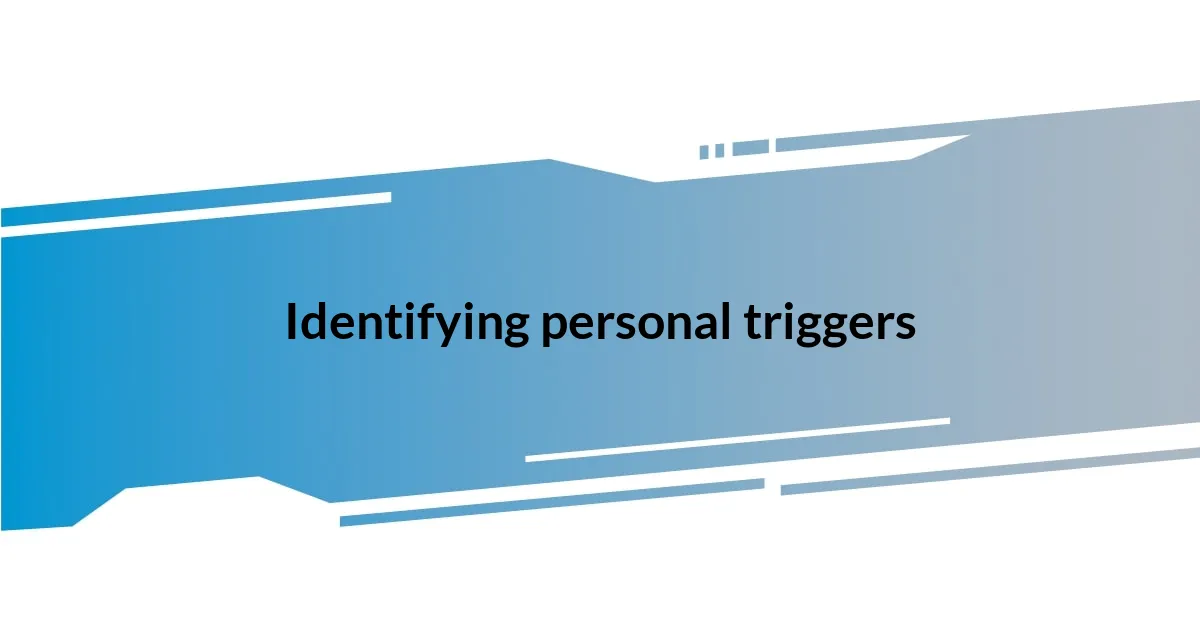
Identifying personal triggers
Identifying what triggers my performance anxiety has been a journey of self-discovery. I’ve come to realize that certain situations heighten my nervousness—like speaking in front of large crowds or presenting to an authority figure. It’s fascinating how our minds react to these scenarios, often amplifying anxiety even before the event begins.
Here are some common triggers I’ve identified:
- High stakes: When the outcome feels crucial, anxiety spikes.
- Unfamiliar environments: New settings can feel overwhelming.
- Past experiences: I’ve felt anxious when recalling previous performances that didn’t go as planned.
- Comparing myself to others: Social media doesn’t help; scrolling can lead to feeling inadequate.
By recognizing these triggers, I can prepare better and approach each performance with a clearer mindset. It’s about knowing myself and having strategies in place to face those nerves head-on.
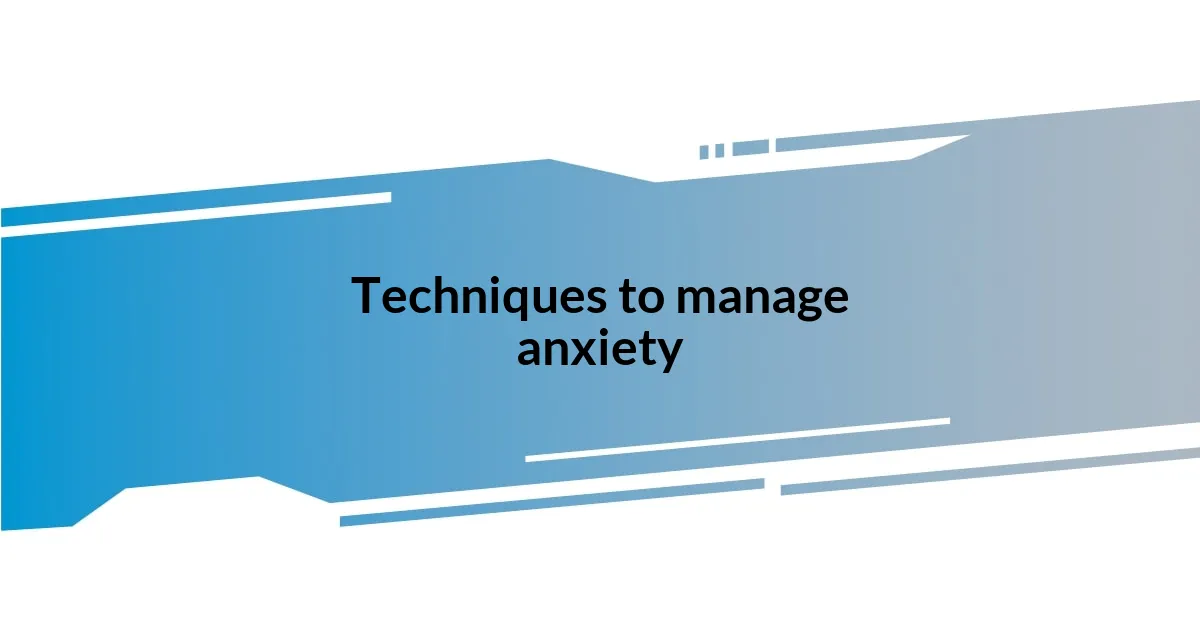
Techniques to manage anxiety
One technique that has significantly helped me manage performance anxiety is visualization. I often close my eyes and picture myself in the moments leading up to my performance. For instance, I imagine myself walking confidently onto the stage, delivering my message with passion, and receiving positive reactions from the audience. This mental practice prepares my subconscious, making the actual experience feel more familiar and less daunting. Have you ever tried visualizing your success? It can transform how you approach a situation.
Another method I’ve found beneficial is practicing deep breathing exercises. When I start to feel that familiar tension creeping in, I take a moment to focus on my breath. Inhale deeply for a count of four, hold for four, and exhale for four. This simple technique calms my racing thoughts and grounds me in the present moment, allowing me to focus better. Just a couple of minutes of this can create a sense of peace amidst the chaos. What are your go-to calming techniques? Finding the right ones for you can make a world of difference.
Lastly, embracing the power of positive affirmations has been a game changer. I remind myself of my qualifications and past successes before stepping into a challenging situation. Phrases like “I am prepared,” “I am capable,” or “I can handle this” reinforce my self-belief and drown out the negative self-talk. Have you developed a personal mantra? Using affirmations can shift your mindset. It’s those small, reassuring reminders that can bridge the gap from anxiety to confidence.
| Technique | Description |
|---|---|
| Visualization | Picturing yourself succeeding can make the experience feel more familiar and less intimidating. |
| Deep Breathing | Inhale and exhale in a structured pattern to calm your mind and ground yourself. |
| Positive Affirmations | Repeating empowering phrases boosts your confidence and counteracts anxiety. |
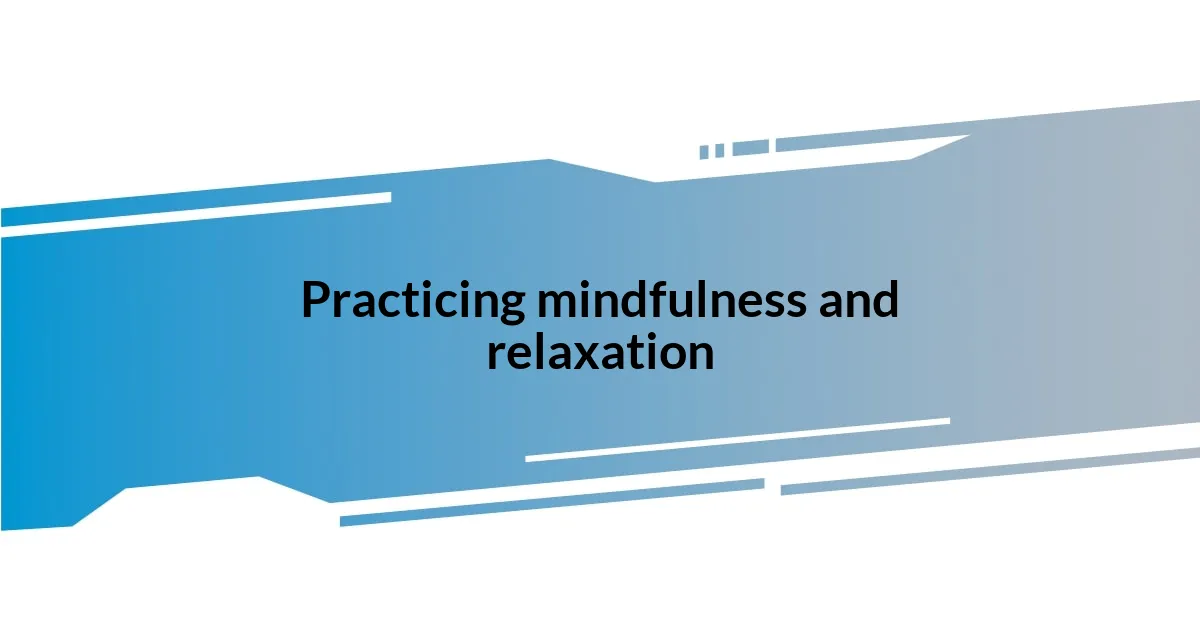
Practicing mindfulness and relaxation
One practice that’s become integral to my routine is mindfulness meditation. Just the other day, I carved out ten minutes to sit quietly, focusing solely on my breath. As I inhaled, I allowed the tension from my day to float away, noticing how it felt to be fully present. This little routine not only calms my racing mind but also sharpens my awareness, grounding me before any high-pressure situation. Have you ever taken a moment to simply be?
In addition, I find that incorporating simple stretching exercises can make a remarkable difference. When I feel that knot of anxiety growing in my chest, I intentionally stand and stretch my arms high above my head, feeling the energy and stress release with each breath. It’s like my body is whispering, “You’re okay, just relax.” It sounds small, but moving my body can transform my mental state significantly. Have you considered how physical movement influences your anxiety?
Another approach I value is using guided imagery. There’s a particular recording that takes me through a serene beach landscape. Closing my eyes, I can almost hear the waves and feel the warmth of the sun. This type of imagery takes me away from anxiety and redirects my focus toward positivity. It’s so powerful to visualize a peaceful scenario, almost like hitting a reset button in my mind. Do you have a favorite memory or image that brings you comfort? Embracing that can truly enhance moments of stress.
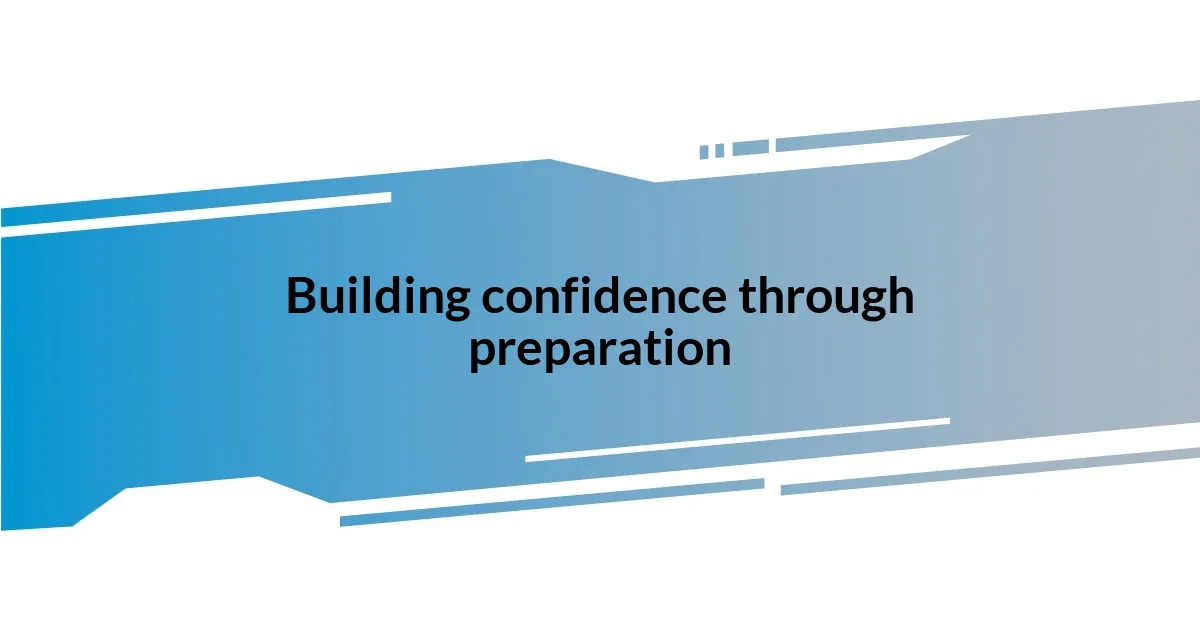
Building confidence through preparation
Preparing thoroughly has always been my secret weapon for building confidence. I remember one particular presentation that had me feeling incredibly anxious. Instead of panicking, I spent hours rehearsing and familiarizing myself with the material. When the day came, I felt a sense of control that allowed me to deliver my speech with ease. Can you recall a time where preparation made a remarkable difference for you?
I enjoy breaking down complex tasks into manageable steps. By creating a checklist, I transform my daunting to-do list into achievable goals. For instance, before an important meeting, I list everything from research to practicing my delivery. Each tick off that list fills me with a small sense of accomplishment. Have you tried this method? It can really help in shifting your mindset from worry to preparedness.
Additionally, I often seek feedback on my practice runs, whether from friends or colleagues. Their perspectives help me pinpoint areas of improvement and reinforce what I’m doing right. Just recently, I shared my ideas with a trusted mentor who offered valuable insights and encouragement. This exchange not only boosted my confidence but made me feel supported along the way. When was the last time you sought feedback? Engaging with others can turn a solitary experience into a collaborative journey.

Seeking professional help
Reaching out to a professional can be a game-changer when managing performance anxiety. I remember the first time I met with a therapist; I was a bundle of nerves just walking into her office. However, as I shared my experiences, I found relief in knowing I wasn’t alone in this struggle. Have you ever considered how support from an expert can provide clarity?
Counseling offered me strategies that I hadn’t encountered before. For instance, my therapist introduced me to cognitive behavioral techniques that reshaped my thought patterns. Initially, the idea of dissecting my thoughts seemed overwhelming, but breaking them down together made a significant impact. It was like turning on a light in a dimly lit room. How often do we underestimate the power of professional guidance in reprogramming our minds?
Group therapy was another helpful experience for me. Hearing others share their vulnerabilities built a sense of community that I didn’t expect. I vividly recall a session where someone voiced feelings I thought were unique to me. That connection sparked an understanding that all of our anxieties are intertwined. Have you ever found that sharing your fears can diffuse their weight? Engaging in these environments not only provided insight but also a comforting reassurance that we’re all on this journey together.
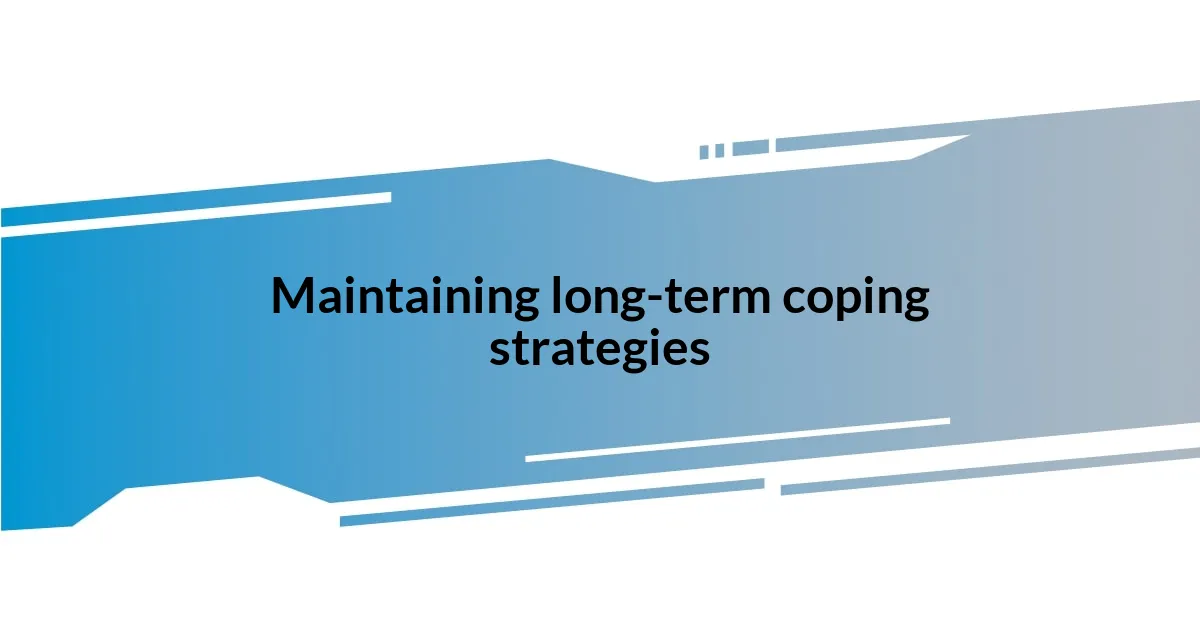
Maintaining long-term coping strategies
Maintaining long-term coping strategies
To maintain long-term coping strategies for performance anxiety, I’ve learned that consistency is key. I remember a time when I’d feel overwhelmed during busy seasons, relying solely on temporary fixes. Slowly, I shifted my focus to incorporating mindfulness practices into my daily routine, even on the days when I didn’t feel anxious. It’s surprising how just a few minutes of meditation or deep breathing can ground me when challenges arise. Have you ever noticed how these small practices can build resilience over time?
Keeping a journal has also played a significant role in my journey. I make it a habit to reflect on my experiences, emotions, and the strategies that worked or didn’t work. One day, I found myself re-reading entries from a particularly anxious week, and it struck me how far I’ve come. Those reflections not only serve as a reminder of my progress but also help me visualize what I need to focus on moving forward. Have you tried journaling? It can be an enlightening way to chart your emotional landscape.
Lastly, I make it a point to connect with others who understand my experiences. I regularly attend workshops and support groups where I can converse with fellow travelers on this path. I recall a moment in a recent workshop when someone shared their breakthrough; it felt invigorating to witness another person’s journey. That encouragement energizes my own commitment to staying engaged with my strategies. How do you stay connected to your support network? Finding your tribe can make all the difference in sustaining your coping mechanisms.